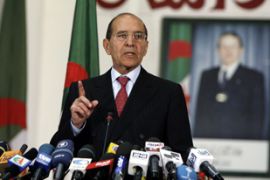Ruling bloc wins Algeria vote
The 35 per cent turnout is a record low since the first multi-party elections in 1990.

He said turnout in Thursday’s poll to elect a new 389-seat lower house of parliament for the next five years was 35 per cent, compared with 46 per cent in the last polls in 2002.
Political analysts said that the turnout was a record low since the first multi-party elections in 1990.
Opposition arrest
The presidency is the most powerful office of state in Algeria and Algerians tend to say it is the incumbent, Abdelaziz Bouteflika, the Algerian president, rather than parliament who really determines policy.
The FLN, which led the 1954-62 guerrilla war for independence from France and governed during the 1962-1989 period of one-party rule, is lead by Abdelaziz Belkhadem, the Algerian prime minister, a close ally of Bouteflika.
Opposition parties had urged a boycott of the poll and on Friday Ali Belhadj, the co-founder of the Islamic Salvation Front, was arrested and taken to the interior ministry office before being set free.
The reason for his arrest was unclear.
Lack of trust
Speaking to Al Jazeera from London, Saad Jabbar, a political analyst, said Thursday’s vote marks a pivotal moment in the nation’s modern political history in the sense that it proves that Algerians do not trust the government or its institutions.
He questioned the official claim of “35 per cent turnout”, but said that the figure anyway confirmed that the government had failed to deliver democracy and justice.
“Instead, the regime has turned into a bureaucratic and military institution,” he said.
The problem does not lie with elections, Jabbar said, noting that Algeria has organised a record number of them by now. The real problem is the credibility and legitimacy of the government, he said.
Violence
The latest election was the third legislative election since an Islamist revolt erupted after the cancellation of a national election in January 1992, which a now-outlawed conservative Muslim party was poised to win.
Up to 200,000 people have been killed in political violence since then.
A triple bombing claimed by al-Qaeda killed 33 people in Algiers on April 11 and a policeman was killed when two small bombs exploded in the eastern city of Constantine on Wednesday.